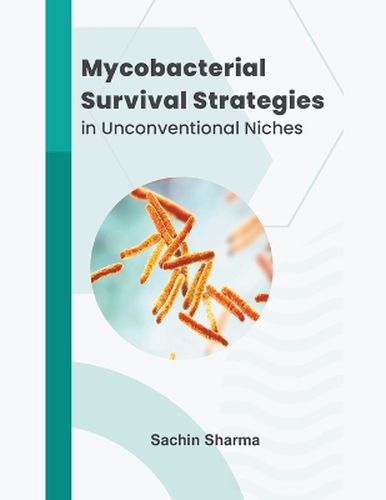Readings Newsletter
Become a Readings Member to make your shopping experience even easier.
Sign in or sign up for free!
You’re not far away from qualifying for FREE standard shipping within Australia
You’ve qualified for FREE standard shipping within Australia
The cart is loading…






This title is printed to order. This book may have been self-published. If so, we cannot guarantee the quality of the content. In the main most books will have gone through the editing process however some may not. We therefore suggest that you be aware of this before ordering this book. If in doubt check either the author or publisher’s details as we are unable to accept any returns unless they are faulty. Please contact us if you have any questions.
In Mycobacterial Survival Strategies in Unconventional Niches, Sachin Sharma delves into the remarkable ability of mycobacteria to survive and persist in a wide range of non-traditional environments. The book explores the molecular mechanisms and physiological adaptations that enable mycobacteria to thrive in unconventional niches such as biofilms, host cells, and environmental reservoirs.
The book begins with an overview of mycobacterial biology and ecology, followed by a discussion of the various non-traditional niches in which mycobacteria can be found. Sharma then delves into the specific strategies employed by mycobacteria to adapt to these environments, including changes in cell morphology, metabolism, and gene expression.
The author also covers the latest research on the role of mycobacterial persistence in the pathogenesis of tuberculosis and other mycobacterial diseases. Additionally, the book discusses the potential implications of mycobacterial survival strategies for the development of new diagnostic and therapeutic approaches.
Overall, Mycobacterial Survival Strategies in Unconventional Niches provides a comprehensive and up-to-date review of the fascinating biology of mycobacteria and their ability to survive in a wide range of environments. The book will be of interest to researchers, clinicians, and students working in microbiology, infectious diseases, and related fields, as well as anyone interested in the molecular mechanisms of microbial adaptation and survival.
$9.00 standard shipping within Australia
FREE standard shipping within Australia for orders over $100.00
Express & International shipping calculated at checkout
This title is printed to order. This book may have been self-published. If so, we cannot guarantee the quality of the content. In the main most books will have gone through the editing process however some may not. We therefore suggest that you be aware of this before ordering this book. If in doubt check either the author or publisher’s details as we are unable to accept any returns unless they are faulty. Please contact us if you have any questions.
In Mycobacterial Survival Strategies in Unconventional Niches, Sachin Sharma delves into the remarkable ability of mycobacteria to survive and persist in a wide range of non-traditional environments. The book explores the molecular mechanisms and physiological adaptations that enable mycobacteria to thrive in unconventional niches such as biofilms, host cells, and environmental reservoirs.
The book begins with an overview of mycobacterial biology and ecology, followed by a discussion of the various non-traditional niches in which mycobacteria can be found. Sharma then delves into the specific strategies employed by mycobacteria to adapt to these environments, including changes in cell morphology, metabolism, and gene expression.
The author also covers the latest research on the role of mycobacterial persistence in the pathogenesis of tuberculosis and other mycobacterial diseases. Additionally, the book discusses the potential implications of mycobacterial survival strategies for the development of new diagnostic and therapeutic approaches.
Overall, Mycobacterial Survival Strategies in Unconventional Niches provides a comprehensive and up-to-date review of the fascinating biology of mycobacteria and their ability to survive in a wide range of environments. The book will be of interest to researchers, clinicians, and students working in microbiology, infectious diseases, and related fields, as well as anyone interested in the molecular mechanisms of microbial adaptation and survival.